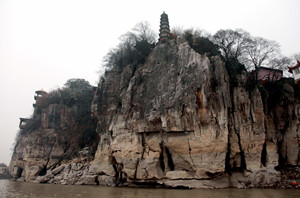
小編導(dǎo)讀:《石鐘山記》是北宋著名文學(xué)家蘇軾的作品。這篇文章通過記敘作者對石鐘山得名由來的探究,說明要認(rèn)識事物的真相必須“目見耳聞”,切忌主觀臆斷的道理。
蘇軾《石鐘山記》
《水經(jīng)》云:“彭蠡之口有石鐘山焉。”酈元以為下臨深潭,微風(fēng)鼓浪,水石相搏,聲如洪鐘。是說也,人常疑之。今以鐘磬置水中,雖大風(fēng)浪不能鳴也,而況石乎!至唐李渤始訪其遺蹤,得雙石于潭上,扣而聆之,南聲函胡,北音清越,枹止響騰,余韻徐歇。自以為得之矣。然是說也,余尤疑之。石之鏗然有聲者,所在皆是也,而此獨以鐘名,何哉?
元豐七年六月丁丑,余自齊安舟行適臨汝,而長子邁將赴饒之德興尉,送之至湖口,因得觀所謂石鐘者。寺僧使小童持斧,于亂石間擇其一二扣之。硿硿焉,余固笑而不信也。至莫夜月明,獨與邁乘小舟,至絕壁下。大石側(cè)立千尺,如猛獸奇鬼,森然欲捕人;而山上棲鶻,聞人聲亦驚起,磔磔云霄間;又有若老人咳且笑于山谷中者,或曰此鸛鶴也。余方心動欲還,而大聲發(fā)于水上,噌吰如鐘鼓不絕。舟人大恐。徐而察之,則山下皆石穴罅,不知其淺深,微波入焉,涵淡澎湃而為此也。舟回至兩山間,將入港口,有大石當(dāng)中流,可坐百人,空中而多竅,與風(fēng)水相吞吐,有窾坎鏜鞳之聲,與向之噌吰者相應(yīng),如樂作焉。因笑謂邁曰:“汝識之乎?噌吰者,周景王之無射也;窾坎鏜鞳者,魏莊子之歌鐘也。古之人不余欺也!”
事不目見耳聞,而臆斷其有無,可乎?酈元之所見聞,殆與余同,而言之不詳;士大夫終不肯以小舟夜泊絕壁之下,故莫能知;而漁工水師雖知而不能言,此世所以不傳也。而陋者乃以斧斤考擊而求之,自以為得其實。余是以記之,蓋嘆酈元之簡,而笑李渤之陋也。
The Stone Bell Mountain
Su Shi
The Classic of Water says: "At the mouth of Pengli stands the Stone Bell Mountain." Its commentator Li Daoyuan(died A.D. 527) states that "there is a deep water at its foot, where the winds and waves striking the rocks make a sound like that of great bells."
People often discredit this statement, for bells and musical stones submerged in waves do not make such a sound, not to speak of rocks. Not until the Tang Period did Li Bo visit the place, where he found two rocks from the water. When struck with a wooden handle, they made a clanging sound, dying away gradually like bells, one in a clearer and the other in a muffled tone. He thought he had thus verified the origin of the name. But I had my doubts, for there are certainly rocks which make a ringing sound when struck, but these were said to make sounds like bells.
In June 1084, I was making a voyage from Qi'an to Linru, and my eldest son, and thus we had no opportunity to visit it and see the stone bells. A monk sent a boy to show us. The boy took an ax and struck at some of the rocks near by at random, but there was nothing unusual about the dull thuds. I gave up for hearsay and laughed.
That night, however, there was a bright moon, and I took a boat with Mai to the foot of the mountain. The river here was flanked by a high cliff almost a thousand feet high. As seen in the moonlight, the rocks looked very much like some weird monsters or dark spirits in frightening postures. The hawks nesting above flew up with raucous cries upon hearing our approach. There was another noise like an old man coughing chortling somewhere in the air. We were told that this came from a species of cranes. I was quite moved and was thinking of turning back when a great noise came over the waters, booming and whining like drums and bells, which quite frightened the boatman.
Upon close examination, I found that at the foot of the cliff were a number of stone caves of unknown depth. When the waves hit the caves, it made that roaring, surging noise. On turning back past Hanshan, at the point where the lake waters joined the big river, there was a huge rock in the middle of the stream, big enough to hold a hundred people. This huge boulder was full of holes and hollows, and the winds and waters sucking through them swish-swashed and make a booming noise, which joined with the clanging from the water caves to make such a symphony.
I said to my son: "Mai, you see. That clanging from the caves will help you to understand the mention in history book of the sound of the bells of the Emperor Jing of Zhou Dynasty, and the boom will help you to appreciate the description of the orchestra bells of Wei Zhuangzi. Evidently, what the ancient books tell us is true."
One is often inclined to doubt ancient records until one personally sees these things. Li Daoyuan must have seen what we have seen, but he was not very explicit. The scholars usually would not take the trouble to take a boat to the foot of the cliff, so they could not have known. The boatmen know about it, of course, but they do not record it in books. Li Bo verified it only superficially by knocking at a couple of rocks on land, and he never really found out where the sounds came from.
I write this down, to show that Li Daoyuan did not say enough and Li Bo did not know enough.
更多精品翻譯素材,敬請關(guān)注可可英語。











